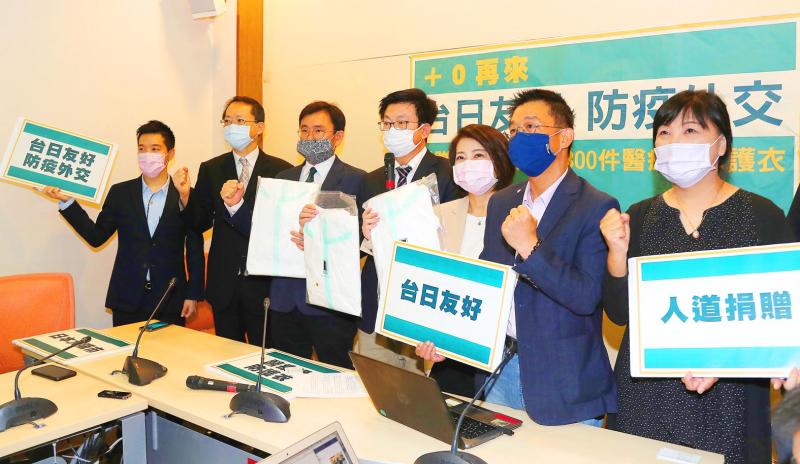A group of Democratic Progressive Party (DPP) legislators have donated 2,300 protective medical gowns to Osaka, Japan, to aid in its efforts to contain COVID-19, DPP Legislator Kuo Kuo-wen (郭國文) said yesterday.
The gowns were airfreighted on Monday and should be received by the Osaka government in the next two days, Kuo, head of an East Asia parliamentary friendship group, told a news conference in Taipei that was also attended by Japan-Taiwan Exchange Association Deputy Representative Nishiumi Shigehiro.
Demand in Taiwan for such gowns has been limited, as this nation has not had a community-level outbreak of the virus, while Osaka is in urgent need of them, Kuo said.

Photo: CNA
DPP Legislator Chou Chun-mi (周春米) said Taiwan has achieved a lot in its fight against COVID-19, and is willing to lend a helping hand to others.
The lawmakers also linked the donation to the government’s desire for Taiwan to become a member of the WHO.
Japan has expressed public support for Taiwan to participate in the WHO, which is why he supported sending the gowns to Japan to help deepen relations, DPP Legislator Huang Kuo-shu (黃國書) said.
Shigehiro thanked the group for their assistance, and expressed gratitude on behalf of the Japanese government for the donation.
Japan has reported 13,614 cases and 385 deaths. A total of 1,521 cases of those have been in Osaka, which has had 29 deaths.
In related news, in an opinion piece published in two Philippine newspapers on Monday, Representative to the Philippines Michael Hsu (徐佩勇) said Taiwan provides a model for successfully controlling COVID-19 without a lockdown, as his host nation prepares for a phased reopening of its economy this week.
In the piece published in the Philippine Star and Malaya Business Insight, Hsu detailed the public health and economic challenges the pandemic has posed to the international community, noting that Philippine President Rodrigo Duterte opted for a policy of “enhanced community quarantine” for Luzon that began on March 16 and is due to end tomorrow.
Hsu explained how the Central Epidemic Command Center was established after the SARS outbreak in 2003 to better coordinate the government’s response across departments.
Activating the center on Jan. 20 helped to quickly implement disease prevention measures, mobilize resources, trace contacts and monitor the outbreak using big data analysis, Hsu said.
Other significant factors have been the center’s daily news conferences and the nation’s healthcare system, he wrote.
He also reiterated the government’s call for Taiwan to be admitted into the WHO: “Let bayanihan spirit shine and include Taiwan in the WHO to achieve ‘Health for All,’” Hsu wrote, using a Philippine word for “cooperative undertaking.”

Chinese Nationalist Party (KMT) Chairman Eric Chu (朱立倫), spokeswoman Yang Chih-yu (楊智伃) and Legislator Hsieh Lung-chieh (謝龍介) would be summoned by police for questioning for leading an illegal assembly on Thursday evening last week, Minister of the Interior Liu Shyh-fang (劉世芳) said today. The three KMT officials led an assembly outside the Taipei City Prosecutors’ Office, a restricted area where public assembly is not allowed, protesting the questioning of several KMT staff and searches of KMT headquarters and offices in a recall petition forgery case. Chu, Yang and Hsieh are all suspected of contravening the Assembly and Parade Act (集會遊行法) by holding

PRAISE: Japanese visitor Takashi Kubota said the Taiwanese temple architecture images showcased in the AI Art Gallery were the most impressive displays he saw Taiwan does not have an official pavilion at the World Expo in Osaka, Japan, because of its diplomatic predicament, but the government-backed Tech World pavilion is drawing interest with its unique recreations of works by Taiwanese artists. The pavilion features an artificial intelligence (AI)-based art gallery showcasing works of famous Taiwanese artists from the Japanese colonial period using innovative technologies. Among its main simulated displays are Eastern gouache paintings by Chen Chin (陳進), Lin Yu-shan (林玉山) and Kuo Hsueh-hu (郭雪湖), who were the three young Taiwanese painters selected for the East Asian Painting exhibition in 1927. Gouache is a water-based

Taiwan would welcome the return of Honduras as a diplomatic ally if its next president decides to make such a move, Minister of Foreign Affairs Lin Chia-lung (林佳龍) said yesterday. “Of course, we would welcome Honduras if they want to restore diplomatic ties with Taiwan after their elections,” Lin said at a meeting of the legislature’s Foreign Affairs and National Defense Committee, when asked to comment on statements made by two of the three Honduran presidential candidates during the presidential campaign in the Central American country. Taiwan is paying close attention to the region as a whole in the wake of a

OFF-TARGET: More than 30,000 participants were expected to take part in the Games next month, but only 6,550 foreign and 19,400 Taiwanese athletes have registered Taipei city councilors yesterday blasted the organizers of next month’s World Masters Games over sudden timetable and venue changes, which they said have caused thousands of participants to back out of the international sporting event, among other organizational issues. They also cited visa delays and political interference by China as reasons many foreign athletes are requesting refunds for the event, to be held from May 17 to 30. Jointly organized by the Taipei and New Taipei City governments, the games have been rocked by numerous controversies since preparations began in 2020. Taipei City Councilor Lin Yen-feng (林延鳳) said yesterday that new measures by